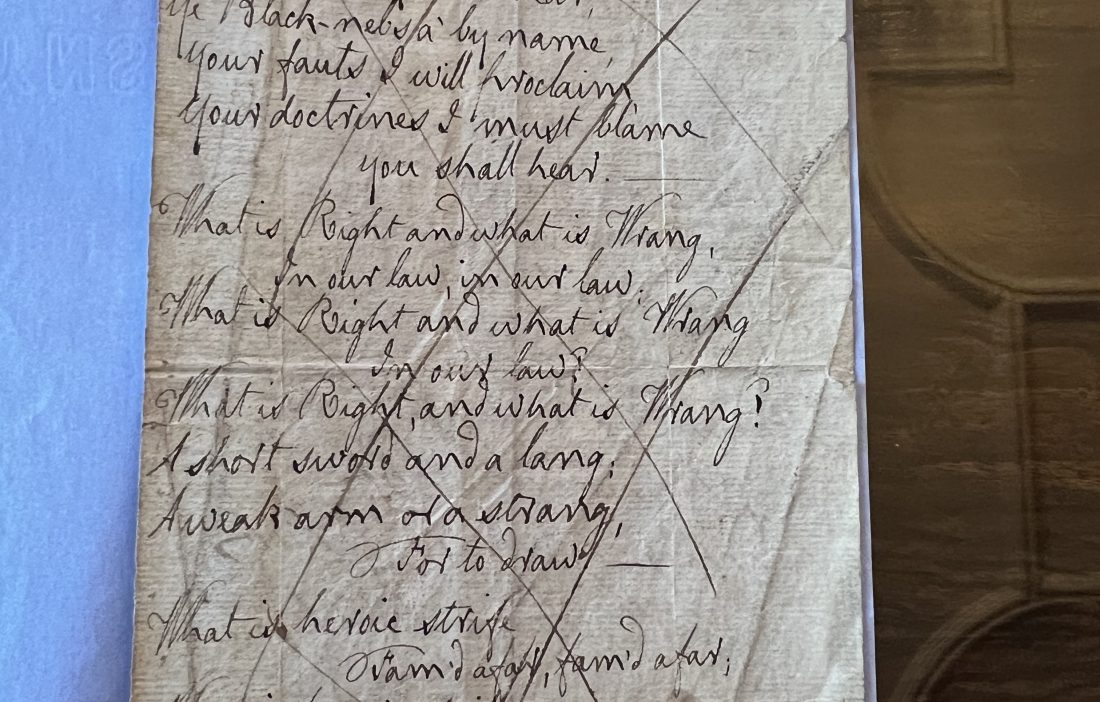A scholar has discovered an unseen manuscript from Robert Burns which he believes could have cost him his career had it been published because of its revolutionary ideas.
The cancelled work was a different version of the famous song Ye Jacobites By Name, which was written by Burns in 1791 in the inflammatory early period of the French Revolution, against which reformers in the British Isles increasingly agitated for political change.
The draft, entitled Ye Black-nebs By Name, featuring writing with implicit sympathy for the radical reformers who were challenging the 1700s British status quo.
It was discovered in the collection of Burns materials held at Barnbougle Castle, near Edinburgh.
Professor Gerard Carruthers of the University of Glasgow’s Centre for Robert Burns Studies, says the discovery gives a fascinating insight into Burns creative genius.
While today Burns is a world-renowned poet and songwriter, he lived a life in which he had no political vote, even as a highly skilled Exciseman working for the very government that denied him that right.
Prof Carruthers believes Burns kept the draft under wraps out of concern the ideas contained within it could put his career as an exciseman for the Crown at risk.

Professor Gerard Carruthers of the University of Glasgow’s Centre for Robert Burns Studies.
‘Black-nebs’, a term for reformers in the 1790s, disappears altogether in the cancelled manuscript as this is supplanted by the final version of ‘Ye Jacobites by Name’.
We only know that by Jacobites he was perhaps actually thinking of contemporary reformers once we are aware of the existence of the cancelled document, now rediscovered.
‘The cancelled ‘Ye Black-nebs’ chimes with other songs, most famously ‘Scots Wha Hae’ and A Man’s a Man for a’ That’ where revolutionary ideas are smuggled in under the guise of writing about the Scottish Wars of Independence or universal brotherhood,’ said Prof Carruthers
‘In the end, ‘Ye Black-nebs’ was more explicit than these texts and is completely overwritten by ‘Jacobite’. Burns’s original version, however, raises the strong possibility that the finished version is code for more recent 1790s revolutionaries.
‘The variant ‘Black-nebs’ [revolutionaries] instead of ‘Jacobites’ in the Barnbougle manuscripts references someone of democratic principles following the French Revolution and raises the intriguing proposition that Burns thought first of composing a lyric in the voice of a disillusioned radical of 1790s before moving from a Jacobin-themed to a Jacobite’ one.

‘If Burns had lived longer, I believe he would have been in favour of political reforms emerging at that time particularly after the Napoleonic wars of the early 1800s.
‘He wouldn’t have continued to use cunning to cover his allegiances I don’t think.
‘But at the time as a Crown employee and at this point in his life, he hadn’t got there just yet. But I believe he would have increasingly been on the side of democratic reform had he lived into the early 19th century.
‘However, when this was written Ellisland, his farm, was not as productive as he would have liked, and things were uncertain financially for him and his growing family.
‘He was therefore dependent on his Excise employment and couldn’t speak as freely as he might have liked.
‘It was a very dangerous time for people who backed political reform in the wake of the American and French revolutions.
‘For example, Thomas Muir, a famous Scottish political reformer, fewer than two years later in 1793 [when ‘Ye Jacobites by Name’ was first published] was transported to Botany Bay with a sentence of fourteen years after having been found guilty of sedition due to the speeches he had given on the ideals of democracy.’
TAGS


